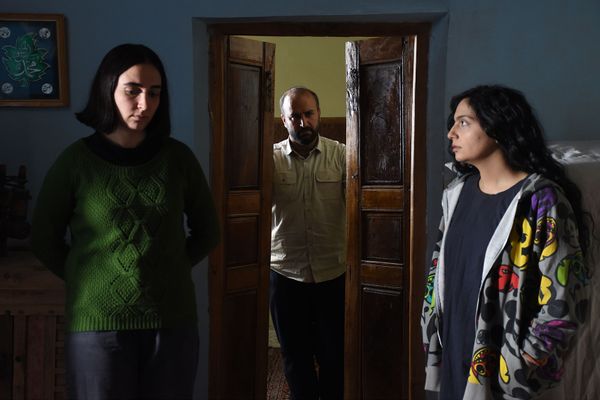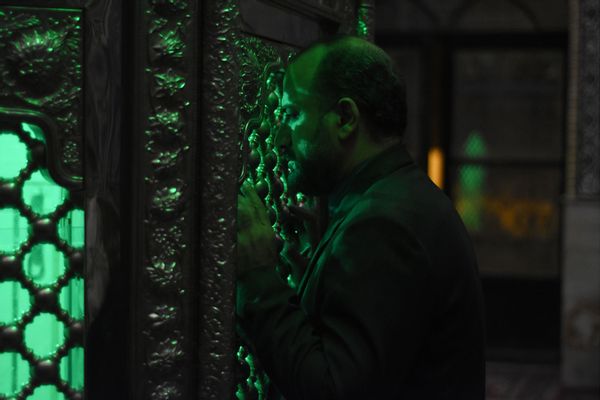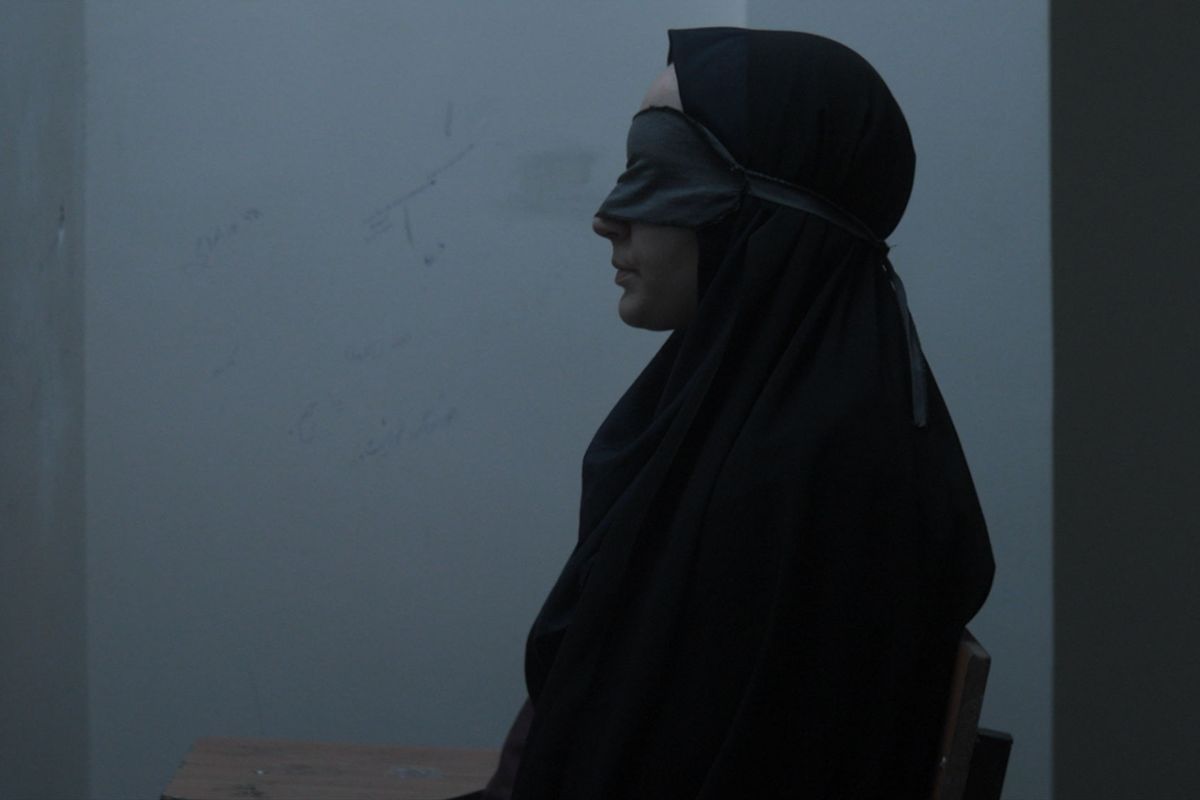Exiled Iranian filmmaker Mohammad Rasoulof’s “The Seed of the Sacred Fig” is a powerful indictment of totalitarianism and the Iran regime. The film, which won both a Special Jury Prize and the FIPRSECI award at this year’s Cannes Film Festival, and is Germany’s Oscar submission for best international film, is a gripping and incendiary drama. It prompted Rasoulof, who was sentenced to eight years in prison, to escape Iran on foot. The film was made in secret, with post-production done remotely.
The filmmaker is no stranger to controversy. His outstanding 2020 film, “There Is No Evil” was an equally brilliant examination of the death penalty in Iran from four perspectives. It, too, was made in secret and, like all of Rasoulof’s films, banned in Iran.
"Patriarchy tends to become repressive, and if we pay attention, that’s what happens in Iran with the regime."
In “The Seed of the Sacred Fig,” Iman (Missagh Zareh), who works in the justice system, gets promoted to an investigator for the State. This puts his family at risk, but his supportive wife Najmeh (Soheila Golestani) is pleased they will soon be able to move to a less cramped apartment. She informs their teenage daughters Rezvan (Mahsa Rostami) and Sana (Setareh Maleki) that they need to be careful not to post anything on social media or reveal the identity of their father as it could put their lives and safety in jeopardy.
But when Rezvan’s friend from college, Sadaf (Niousha Akhshi) becomes involved in the “Woman Life Freedom” protests in Tehran, it emboldens both daughters and forces Najmeh to keep a secret from her husband, who is sure to disapprove.
As tensions rise, things are further complicated when Iman’s gun goes missing and he suspects one of his family members of stealing it. His efforts to get to the bottom of who took his weapon culminate in a series of very intense episodes.
Iman represents Iran, as well as submission, faith and absolute obedience. In contrast, his daughters are emblematic of the changing world, and his wife is caught in the middle, protecting both her husband and daughters.
With the assistance of an interpreter, Iante Roach, Rasoulouf spoke with Salon about his remarkable and courageous film.
This film tackles issues about state control. Can you talk about your strategy as a filmmaker to provoke and question authority?
For me, the most important issue is the relationship between individuals and power and accepting responsibility and individual responsibility. This is something I think about all the time. I’m convinced that in a society where there is a high level of taking on personal responsibility it is harder, if not impossible, for totalitarianism to take root. On the other hand, there is also another concept, vis-à-vis, personal responsibility, which I tend to call [speaks Persian] which means “Handing your head over to someone else.” We could translate that as submission to power, to ideology. I try to tell stories about the relationship between individuals and power, and naturally, this leads to them having a political dimension.
“The court is not your home,” one character says when Iman gets authoritative. He wants to “restore” his family which he feels is splintering apart. Can you talk about the issues of public and private? How laws are applied in society, but different rules are applied within a family?
Totalitarian society is almost as if power and ideas are [configured] with the head at the top of the pyramid and projected downwards to member of society. In the film, there is a scene where Iman and his wife are praying. We see Iman praying and submitting to a higher power, in this case, a religious divinity, a god. Then we see his wife behind him, following him. He wants the same from his children. They should also follow him. It is as if the person who chooses to submit to power or an ideology wants others to submit to him or her. It is a chain of relations.
We need your help to stay independent
The film addresses protests against an authoritarian regime. Iman, the patriarch, becomes a microcosm for the macrocosm of Iranian society the film depicts.
The film was made outside of the realm of Iranian censorship in defiance of it. But I think the main issue goes beyond patriarchy. In this specific case, it is set within a totalitarian, religious, theocratic regime, as patriarchy is the particular shape the submission to power takes within this country because men are clearly, within that system, considered superior to women.
 The Seed of the Sacred Fig (Neon)
The Seed of the Sacred Fig (Neon)
Did Iran specify what was objectionable about your film that was banned?
You would never be able to get permission to shoot such a film that posits these topics in Iran. It is more that they think the film in its entirety is wrong and should not exist.
The gun in the film is a symbol. It is faith. It is “the law,” and it is the “system.” It is the father. What can you say about the ideas of authority and safety and paranoia?
The film sets out as a family drama where the family dynamics and relationships are the most important thing, and it slowly unravels in a quite different direction. The weapon is a symbol of power, and what I wondered was if the figure who impersonates power thinks or is afraid that they will lose that power, how will they react? In such circumstances, my guess is that patriarchy tends to become repressive, and if we pay attention, that’s what happens in Iran with the regime. I think that these concepts eventually transcend the family and that allows us to see the family as representing society at large, rather than just one specific entity. And as we approach the end of the film, there is a new layer which is a historical gaze at the story of Iran and the story of the film within context of Iranian history.
I appreciate that “The Seed of the Sacred Fig” asks viewers to put themselves in the position of the characters: Do you protest like Sadaf? Do you help someone like Rezvan? Do you turn a blind eye to the protests like Najmeh? Or do you punish like Iman? I kept shifting my perspective and aligned with each character at different times. What do you want viewers to glean from your film?
I think it is important that you see the human facets of someone who collaborates with the regime and is a cog of the regime. A father loves his children and wants the best for them even if he collaborates with a highly repressive state. At the same time, Iman wants to choose what is best for his children in order to best protect them. If we look at the mother, she of course, to quite an extension in the film, is an active agent of patriarchy even though she is a woman. Because she thinks she can only achieve safety, even just for herself, by protecting the family. People who collaborate with regimes of this sort are not necessarily monsters. But what is scary about them is that they have given up their capacity for free thinking and they refer to an external authority. That’s why I insist on the fact that the main theme is submission to power or ideology.
All the characters lie, deceive or hide the truth. What observations do you have about this?
The question is: Why do they do that? The totalitarian systems always want you to hide your real self. The father hides many things because he is afraid of power and those above him. The mother hides many things because she is afraid of the father. The children do the same because they are afraid of both parents. And what is lost here is trust. And that is absolutely what a totalitarian system needs in order to hold on to power and continue its job. It is the way society becomes atomized, and people cannot come together to effect change. What is interesting here is how at this way of operating it penetrates down from top of a pillar to a nuclear family. When the father is so convinced of the ideas and of the truth, that he has chosen to submit himself to that, there is no other reality in the world. I think in the end what will happen is that this mistrust or distrust will pervade the system itself and destroy it from within.
"People who collaborate with regimes of this sort are not necessarily monsters."
To give an example, one day, when I was in prison in 2022, at the height of the “Woman Life Freedom” movement, I was walking along a corridor and a prison guard took me by the arm and took me into another corridor, where we would not be filmed by the closed circuit cameras, and he asked me, “What do you think is going to happen?” I told him, “Well, actually, you are the person who can go out of here and see what is happening with all these protests. Perhaps you should be the one who tells me.” And the guard says, “If things get really bad and there is a regime change, would you be ready to say we treated you here very well?” And that is really the way this family [in the film] is impacted. The deep rift that takes place within it is a consequence of external events.
 The Seed of the Sacred Fig (Neon)
The Seed of the Sacred Fig (Neon)
It is the metaphor of the seed of the sacred fig of the title, which corrupts and takes over. It is the symbol of a tree killing its host to survive. Can you talk about this metaphor for Iran?
Absolutely, but then again, I am convinced that the beauty of this metaphor as a title is that you can look at it from the perspective of each different character and draw a different conclusion, or see a different story being told by the title. If we look at the tree’s life cycle from the viewpoint of the daughters, what is beautiful and interesting is the hope that these new shoots represent. Whereas if we take on the father’s perspective maybe what would interest us are the unethical aspects of the tree story. I love playing with titles where you can read different meanings.
“The Seed of the Sacred Fig” is a very intimate and claustrophobic, especially the first half set in the family’s home. Can you talk about shooting close-ups of an injured face, or the detail of Najmeh shaving Iman?
I was very keen to get across how this man, Iman, has turned his own home into a prison — a prison within which life is still present, and still happening. The scene in which Najmeh is removing the fragments of the bullet from Sadaf’s face reminds us of the humanity that is present in all these characters. Because in the end it is a decision the mother takes to ignore what she sees in order to protect her husband’s job and what she perceives as the family’s safety and security. When she is shaving her husband’s face and taking intimate physical care of him, it is her way of helping him achieve his aims and dreams. In that scene, we hear a piece of music that refers to an Iranian poem which reminds us how in Iranian culture, even love is something where you have to submit. And that is what I really like to investigate — does that mean this submission to power has deep cultural roots and is that where it comes from and is that why it is allowed to continue? Or is it the other way around — is this culture and literature a result of a millennia of tyranny that has seeped into the culture?
Want a daily wrap-up of all the news and commentary Salon has to offer? Subscribe to our morning newsletter, Crash Course.
The film is getting considerable Oscar buzz. What would it mean for you if this film gets shortlisted or even wins the Oscar?
Well, I’m totally stunned. I never thought about the Academy Awards ever in my professional life. I saw a submission from Iran as the only way to have access to the Academy. Of course, all of my films are banned, so there is no way they will ever send them to the Academy. The way this film was made was quite different, and in the end, it led to Germany choosing to submit it as best international feature film. This has a great deal of significance for me. It feels to me as if whoever made this choice in Germany decided to have their people become the spokespersons for my people, for another people. I think this shows that the human aspect of cinema is stronger than its tribal one.
Finally, if it is not prying, can you talk about living in exile?
It’s very early days. I’ve been so busy and have been travelling non-stop that I have yet to get to that moment when I may feel I have some control over my time and can start thinking about this. I don’t know when that moment will come.
“The Seed of the Sacred Fig” opens Nov. 27 in select theaters with national expansion to follow.
Read more
interviews by Gary Kramer



Shares